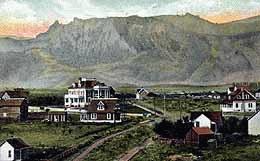On December 7, 1899, Governor John R. Rogers (1838-1901) formally establishes Chelan County out of the northern part of Kittitas County and the southern part of Okanogan County, with Wenatchee designated as county seat. As a compromise with the town of Chelan, which had also campaigned to be county seat, county commissioners select Chelan-area residents as the county officers. The first courthouse is a vacant hotel provided by the developer of Wenatchee.
In 1892, the Great Northern Railway completed its transcontinental railroad line to Wenatchee from Spokane. This resulted in growth as growers and ranchers shipped their products and new settlers arrived. The Wenatchee River was the boundary between Kittitas and Okanogan Counties, so to transact official business, residents either had to travel up the Columbia and Okanogan Rivers to Conconully or over the mountains to Ellensburg. As the population grew, residents wanted their own county. In 1893, they applied to to form Wenatchee County, consisting of the Wenatchee Valley. The legislature adjourned without action on the measure.
The growing city of Wenatchee was just as big as the town of Chelan. Chelan boosters argued that the hydroelectric potential of the falls on the Chelan River made their town the logical seat of county government. Wenatchee partisans said the railroad made their town the best choice. The Wenatchee Development Co. surveyed and platted the town site as part of the construction of the railroad, then sold lots to new arrivals. Wenatchee Development head Judge Thomas Burke, of Seattle, offered four lots and an unsuccessful brick hotel at the corner of Wenatchee Avenue and Kittitas Street as a courthouse (Wenatchee historian John Gelatly says that the choice of Wenatchee was determined by the offer of the free lots and hotel. But Steele, who quotes the original sources, demonstrates that the offer of the hotel, signed by Judge Thomas Burke, came a year after the legislation identifying Wenatchee as county seat.)
Stehekin rancher M. E. Field served in the State Legislature and he introduced the bill to establish Wenatchee County out of the watersheds of the Wenatchee River and Lake Chelan and its tributaries that run down to the Columbia. Governor Rogers signed the bill into law on March 18, 1899. The act stipulated that Wenatchee was the county seat and that the governor should appoint three commissioners who would organize the county government. In the Senate the bill was amended to rename the county Chelan.
One feature of the legislation was a guarantee that Okanogan County's population would not fall under 4,000. A May 1899 census showed that the new Okanogan County would have only about 2,839 residents. Then a Conconully judge ordered another census taken in August when the mining camps were full of workers. Okanogan County had the required population after division, and Chelan County could organize.
Rogers appointed Dennis Strong of Mission (later Cashmere), Dr. G. W. Hoxsey of Leavenworth, and Spencer Boyd of Chelan. Hoxsey declined the job, so the governor named T. J. Cannon of Entiat to the vacant seat. Cannon declined. The governor offered the name of Conrad Rose of Wenatchee. He accepted. With the commissioners in place, Rogers signed the county into existence on December 7. Rose was sworn in on February 23, 1900, and the commissioners were ready to do the people's business.
As a way to soften the disappointment of Chelan's backers, the commissioners named Chelan-area residents as auditor, treasurer, sheriff, county clerk, and county engineer.
Chelan was a small county and could afford salaries of only $65 a month for its officers. To help with the expense of public service, county officers were authorized to live in the courthouse rent-free. Sheriff Frank Keller (Stehekin rancher), Auditor Charles Trow (Lake Chelan steamboat captain), and Howard Graham (Chelan grocer) made some minor changes to the upper floor and moved in. They had to pay for their own firewood and coal oil for heat and light. With no income from taxes, salaries and county expenses were paid with interest-bearing warrants. The commissioners had to give Okanogan County $77,000 and Kittitas County $29,000 in interest-bearing warrants as its share of the parent counties indebtedness.
In the 1920s, Judge Burke arranged to deed the lots and courthouse to the County for one dollar.

